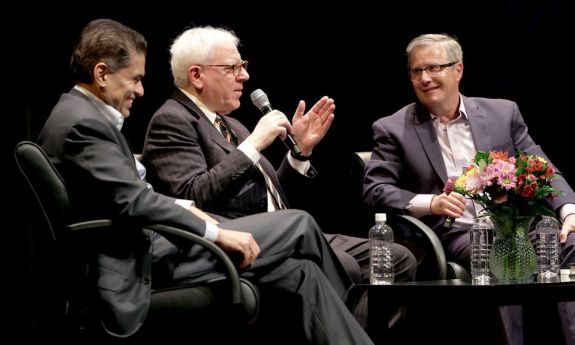The Challenges Facing America and Higher Education
David Rubenstein, Fareed Zakaria address elites and populists in a fast-changing world

“But what has happened is … everyone has been learning from the best practices. … And so what you have is a world in which it's a lot of these middle powers who are much more unwilling to simply take directions from Washington.”
The United States knows how to handle China and Russia, he said, but countries including India, Brazil, Turkey and Indonesia are “no longer are willing to play the role …,” said Zakaria, who cited his new book, “Age of Revolutions: Progress and Backlash from 1600 to the Present.”
Rubenstein added that the spread of technology has helped empower more countries, and that events such as the Jan. 6 insurrection erode the United States’ reputation among other nations.
“It's not that America has been supplanted by China, we're not going from an American century to a Chinese century; America is still very, very powerful. … What you have is a world in which it’s a lot of these middle powers who are much more unwilling to simply take directions from Washington.”
Fareed Zakaria
“There’s nothing in the Constitution or any other document that says the United States has to be the most important country in the world forever,” Rubenstein said.
Moderator Peter Feaver, a Duke professor of political science and director of event organizer the Duke Program in American Grand Strategy, asked Rubenstein and Zakaria about how challenges facing higher education are affecting public trust.
“Almost anybody can get a college education if they really want one, and get a very good one if they really work hard … and I think that's one of the reasons why our education system, while it’s criticized, is still the envy of the world,” said Rubenstein, who estimated that he’s served a combined 50 years on university boards, including at Duke and Harvard.
“The crises we have on universities, they're significant but I don't think they're gonna destroy the universities. The only thing that could destroy the universities is the people on Capitol Hill trying to do something that destroys them. But I think it's a temporary kind of thing. In the end these universities are going to survive most members of Congress.”
Zakaria agreed with Rubenstein on the excellence of U.S. higher education, but he believes universities here “have gone astray.”
“There’s nothing in the Constitution or any other document that says the United States has to be the most important country in the world forever.”
David Rubenstein
“This happens often with … this kind of liberal democracy and freedom of speech, which is motivated for very good reasons to address problems of people being excluded or not equally or fairly represented.
“But the result has been that I think universities have lost their focus on excellence and education and have spent a little bit too much time worrying about solving every social problem in the world. And in doing that, they tie themselves up into knots.”
Zakaria added: “People have to be allowed to speak freely their political views even if their views are repugnant or offensive to others. The whole point of going to universities is to confront views you disagree with you find offensive. And we live in a society where those kinds of diverse views have always been tolerated.”
On politics, they said changes in the demographic makeup of the U.S. -- such as the rise in non-white citizens -- and the increase in tech-based jobs have left many Americans feeling left behind. Former President Donald Trump has tapped into that despair, Rubenstein said.
“Many people feel disenfranchised, and they have less power, their children are gonna be less likely to get to the top (positions),” Rubenstein said. “(They feel) our country isn't really doing what we want to help ourselves. They’re helping the elites in New York, the elites in Los Angeles, the people with fancy college degrees from Yale or Duke or places like that. And these people have been captured in a way by Donald Trump, in a way that I don't think many politicians thought could be done.”